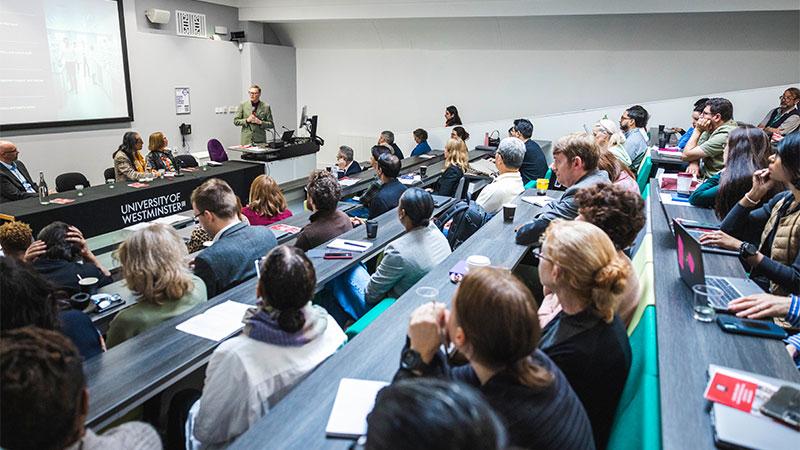The University of Westminster hosted its inaugural Research Culture Symposium to kickstart the University’s Year of Research Culture 2025/26. The event aimed to encourage new thinking around the culture, inclusivity, ethics and practices of research across disciplines, featuring external speakers, panel discussions and sessions to showcase and inform the University’s ongoing and planned initiatives to strengthen research across its campuses.

Inclusive research culture is a key commitment in the University’s strategy, where diversity, equity and integrity are central pillars. The University’s Research Culture Statement commits to “research for everyone”, embedding inclusion, ethics and development into every stage of the research process, ensuring all members of its community can bring their whole selves to work and have a world leading impact.
The symposium, held on 10 October at Fyvie Hall on Westminster’s Regent Campus, aimed to advance this commitment by providing a space for academics, doctoral researchers, professional services colleagues and external partners to engage, reflect on institutional and sectoral norms and explore new directions. It also marked the launch of the University’s Year of Research Culture.
Professor Fiona Ross from Kingston University kicked the event off with an opening keynote, setting the tone by exploring equity, diversity and inclusion in academic research. Drawing on decades of leadership experience, Professor Ross highlighted systemic challenges and strategies for creating environments where diverse voices can thrive.
This was followed by a session on Westminster’s own developments, led by Professor Miriam Dwek, Professor Gregory Sporton and Professor Franz Buscha, Associate Heads of College for Research and Knowledge Exchange, who outlined institutional progress and ambitions.
The second keynote came from Stuart King, Research Culture and Quality Manager at Loughborough University. King spoke about how research evaluation can be used as a tool for culture change, exploring how evaluation practices can shape institutions.
Saskia Walcott, CEO to Walcott Communications Ltd, Director to the Board of the Association for Research Managers and Administrators, and Chair to the Professional Development Committee, delivered the third keynote, addressing ethical considerations and the impact of research. Her talk examined how ethical practices shape both the conduct and consequences of research.
The final external speaker James Graham, Head of Research Software Engineering at King’s College London, focused on uncovering the hidden roles in digital research, shedding light on often-overlooked contributors who enable large-scale computational research.
Throughout the day there were a variety of case studies presented to showcase the research and professional development work going on at Westminster. These included the Black History Year Researcher Network, the University’s Technician Commitment, Westminster’s Digital Research Champion Scheme and the Enact Practice Research Data Service (Enact).
The day closed with a panel discussion chaired by Professor Andrew Linn, Deputy Vice-Chancellor for Research and Knowledge Exchange, and was followed by closing remarks from Professor Dwek.

Professor Dwek said: “This was a very stimulating start to our Year of Research Culture. The many provocations that were set will help us to frame our priorities for the coming period. There is plenty to celebrate but also much work to do. I look forward to leading this work.”
Professor Linn said: "Our research culture at Westminster reflects our inclusive ethos. As a research community we are multidisciplinary, we have different backgrounds and networks, we make different contributions to the generation and dissemination of new knowledge, but everyone’s role and input must be equally valued. Creating and sharing new knowledge involves students as much as academic colleagues and colleagues across our professional services. Celebrating research culture is a chance to proclaim that ‘research is for everyone'; but it is also a chance to better understand where we are not as inclusive as we should be and so make changes.”
Dr Muriel Swijghuisen Reigersberg, Head of Westminster’s Research and Knowledge Exchange Office, added: “I am pleased that at Westminster we are committed to showing that research and knowledge exchange culture is for everyone and that we all should be unafraid to get stuck in, be curious and champion all the excellent research and knowledge exchange being done at Westminster, not just this year, but also in years to come! This Research Culture Symposium will be the first of many!”
The symposium and the University’s commitment to inclusive research and knowledge exchange directly contributes to the United Nations Sustainable Development Goals (SDG) 4: Quality Education, 10: Reduced Inequalities and 17: Partnerships for the Goals. Since 2019, the University of Westminster has used the SDGs holistically to frame strategic decisions to help students and colleagues fulfil their potential and contribute to a more sustainable, equitable and healthier society.
Find out more about the University of Westminster’s Research and Knowledge Exchange Strategy 2022-29.









